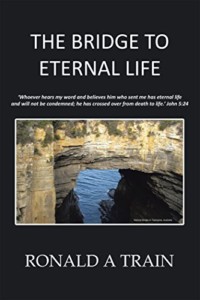Title: The Bridge to Eternal Life
Author: Ronald A Train
Publisher: XlibrisAU
ISBN: 978-1-52451-981-0
Pages: 204
Genre: Religion/Inspirational
Reviewed by: Allison Walker
Pacific Book Review
Religion comforts. The belief in a soul that exists beyond the constraints of Earthly flesh, or the belief in some ‘life’ after death, is comforting to many religious followers. What would happen if we doubted life after death? In his book, The Bridge to Eternal Life, author Ronald A Train confronts this precarious topic; presenting a meticulous and well- crafted argument for the existence of something beyond physical life.
Train is an insightful, well-educated author who is precise in presenting his argument for eternal life. He leaves no stone unturned. For example, he explains the methods of interpreting the Bible, the etymology of ‘life’ and ‘death’ in the Bible and how the New versus the Old Testaments validate eternal life. Train’s thoroughness not only supports his argument beautifully, it shows the depth of his study into the Bible and therefore his credibility as an author and his passion for his work. Without passion, Train’s argument for eternal life would not seem nearly so convincing and his opinions not nearly so reliable.
No literature is created in a vacuum, not the Bible nor his own book, and Train must be respected for his acknowledgement of that. He presents different interpretations of the Bible, not just in how scholars have read it but in how the authors themselves might have interpreted God’s Word according to their earthly place and time. He states very plainly that his own study of the Bible is an Australian’s interpretation. He is very clear in building his argument for eternal life and how to read his book for the way in which it was written. This self-awareness gives readers options whether to trust Train’s work, but ultimately we decide to do so because of his total honesty.
Much study went into the creation of The Bridge to Eternal Life as many sources are quoted in the text and listed in footnotes. Once again, this fastidious consideration is a marvelous argument for the validity of Train’s belief in eternal life. What is frustrating is the way in which many of the sources are explained in the book. Certain names are presented in conjunction with a brief explanation of who the person being quoted is, others however are conspicuously absent of any description. For example, Charles Wood is quoted but no explanation is given for why Wood’s opinion might be trusted. Then, shortly after, Karl Bath is described as a Swiss theologian considered to be the greatest Protestant theologian of the twentieth century, but is not actually quoted in the book. Certain people famous enough to not need an introduction, such as Isaac Newton, are explained. Small inconsistencies such as this make it difficult to follow Train’s presentation at times.
Overall, the thoroughness of Train’s work is inspirational. Not only are his individual arguments fascinating in and of themselves, but they build together to support his belief in eternal life. It is difficult to consider any counter argument to eternal life or to doubt the existence of it, so complete is Train’s interpretation of the Bible. The Bridge to Eternal Life should rest in the library of any person needing the comfort of life after death.



Follow Us